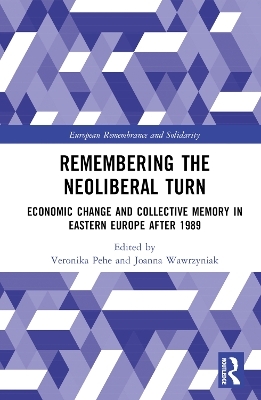
Remembering the Neoliberal Turn
Routledge (Verlag)
978-1-032-55333-7 (ISBN)
The volume shows how the key processes that impacted many lives across the social spectrum in Eastern Europe, such as deindustrialization, privatization, restitution and abrupt social reorganization, are collectively remembered across society today and how memory narratives of the 1990s contribute to current identities and political climate. This volume establishes the memory of economic transformation as a research focus in its own right. It investigates different levels of memory, from the national through the local to the cultural, analysing key myths of the transformation, giving special recognition to the social space and vernacular memories of the transformation period and reflecting on how the changes of the 1990s are mediated in cultural representations.
Given the book’s interdisciplinary scope that covers several fields, it will prove to be of interest to those working in memory studies, contemporary history, sociology, East European area studies and literary and film studies. It will also serve as a significant point of reference for those researching the interdisciplinary and rapidly expanding field of transformation studies and thus is an invaluable source across different fields.
Veronika Pehe is a researcher at the Institute of Contemporary History of the Czech Academy of Sciences, where she leads the Research Group for Historical Transformation Studies. She specializes in cultural history, memory and film and television. Joanna Wawrzyniak is associate professor in sociology and director of the Center for Research on Social Memory at the University of Warsaw. She is vice chair of the EU COST Action Slow Memory: Transformative Practices for Times of Uneven and Accelerating Change.
Introduction: Neoliberalism, Eastern Europe and collective memory: setting the framework (Joanna Wawrzyniak and Veronika Pehe) Part One: Founding myths and counter-narratives of the transformation 1. Shock therapy mythologies: contested memories of Poland’s Balcerowicz Plan (Florian Peters) 2. A recurring bone of contention: the memory politics of Slovakia’s economic transformation (Matej Ivančík) 3. From communism to neoliberalism: conflated memories of Bulgaria’s corrupted transition (Tom Junes and Ivo Iliev) 4. Political uses of memory of the early period of the post-Soviet transformations in contemporary Russia (Olga Malinova) 5. Regimes of truth and the discontent of memories: self-deception and denial during the growing together of the two Germanies (Thomas Lindenberger) Part Two: Vernacular memories and biographical narratives 6. Change, skills and the shifting horizons of social recognition: East German and Czech care workers remember the disruptive 1990s (Till Hilmar) 7. ‘The lost years’: gender, citizenship and economic change in Romania during the long 1990s (Jill Massino) 8. 'There was no more work, no more life, no more anything…': Hungarian workers’ memories of the neoliberal transition (Tibor Valuch) 9. How the Polish business elite remembers the neoliberal turn (Kamil Lipiński and Joanna Wawrzyniak) 10. The neoliberal turn in biographical narratives of young people in Poland (Adam Mrozowicki and Justyna Kajta) Part Three: Cultural memory of economic change 11. Privatization comedies as media of memory of the Czech(oslovak) economic transformation (Veronika Pehe) 12. Screening the criminal underworld of capitalist nation-state making: Dogs and memory of the 1990s in Poland (Saygun Gökarıksel) 13. The moral right to economic crime: remembering the Russian 1990s in a tragic mode in Alexei Ivanov’s Nasty Weather [Nenast’e] (Ksenia Robbe) 14. Films without a viewer: Ukrainian filmmakers and memory of the neoliberal turn in the post-Soviet space (Olga Gontarska and Veronika Pehe) 15. German ‘floating gap’: post-unification memory in literary fiction (Joanna Jabłkowska and Magdalena Saryusz-Wolska) 16. ‘We’re rushing towards capitalism like the Titanic towards a fucking iceberg’: representations of East German (social) transformation in films and TV series from the 2000s until today (Anna Lux) 17. Memories of the neoliberal turn in comparative perspective: a research agenda (Veronika Pehe and Joanna Wawrzyniak)
| Erscheinungsdatum | 30.08.2023 |
|---|---|
| Reihe/Serie | European Remembrance and Solidarity |
| Zusatzinfo | 2 Tables, black and white; 3 Line drawings, black and white; 3 Illustrations, black and white |
| Verlagsort | London |
| Sprache | englisch |
| Maße | 156 x 234 mm |
| Gewicht | 660 g |
| Themenwelt | Geisteswissenschaften ► Geschichte ► Regional- / Ländergeschichte |
| Geschichte ► Teilgebiete der Geschichte ► Kulturgeschichte | |
| Geisteswissenschaften ► Philosophie | |
| Sozialwissenschaften ► Soziologie ► Spezielle Soziologien | |
| ISBN-10 | 1-032-55333-2 / 1032553332 |
| ISBN-13 | 978-1-032-55333-7 / 9781032553337 |
| Zustand | Neuware |
| Haben Sie eine Frage zum Produkt? |
aus dem Bereich


